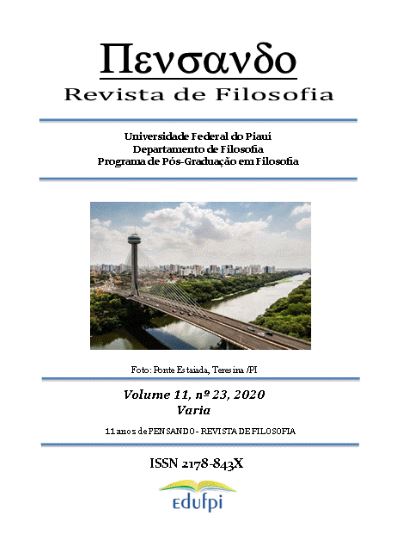ACERCAMIENTO CRÍTICO A LA PREGUNTA POR LA EMOCIONALIDAD EN EL EMPRENDEDURISMO HIGH-TECH. ¿UNA GESTIÓN TECNICISTA?
DOI:
https://doi.org/10.26694/pensando.v11i23.11119Palavras-chave:
Empreendedurismo, Emocionalidades, Neoliberalismo, Teologia políticaResumo
Este artículo tiene como propósito indagar de manera crítica sobre el rol de las emociones y la gestión de éstas en el marco del paradigma del emprendedurismo high tech. Este paradigma surgió dentro del sistema neoliberal, entendido aquí como un sistema teológico-político postmoderno. La investigación, interdisciplinaria y bidireccional, pone en diálogo un marco teórico específico con resultados empíricos de trabajo de campo, combinando el campo de la filosofía de la tecnología con el de la antropología. El punto de partida es un caso situado analizado a partir del marco teórico propuesto. Se han identificado las características esenciales del sistema neoliberal como sistema teológico-político para establecer su relación con el horizonte de posibilidad del emprendedurismo high-tech. En segundo lugar, ha sido problematizado un caso etnográfico dentro de este marco teórico, en base a lo cual se han formulado preguntas ancladas en las prácticas de los actores sociales.
Referências
AHMED, Sara. “Affective economies”. En: Social Text: n. 22, vol.79, 2004, pp. 117-139.
BOSTROM, Nick. “Human genetic enhancements: A transhumanist perspective.” The Journal of Value Inquiry : 37(4), 2003, pp. 493-506.
ETZKOWITZ, Henry et. al. “The future of the university and the university of the future: evolution of ivory tower to entrepreneurial paradigm”. En: Research Policy: n. 29, 2000, pp. 313–330. 2000.
FRIDMAN, Daniel. El sueño de vivir sin trabajar. Buenos Aires: Siglo Veintiuno Editores, 2019.
IRANI, Lilly. “Hackathons and the Making of Entrepreneurial Citizenship”. En Sage, 2015, pp. 799-824.
GORTON, Kristyn. “Theorizing emotion and affect”. En: Feminist Theory: n.8, 2007, pp 333-348.
GUBER, Rosana. La etnografía, método, campo y reflexividad. Bogotá: Grupo Editorial, Norma, 2001.
HAN, Byung-Chul. Aviso de derrumbe. https://elpais.com/cultura/2014/03/18/actualidad/1395166957_655811.html (último acceso en 10/07/2020).
HAN, Byung-Chul. Psicopolítica. Barcelona: Herder, 2014.
HAN, Byung-Chul. Topología de la violencia. Barcelona: Herder, 2016.
IRANI, Lilly. “Hackathons and the Making of Entrepreneurial Citizenship”. En Sage, 2015, p. 799.
KOTSKO, Adam. Neoliberalism’s Demons. On the Political Theology of Late Capital. Stanford: Stanford University Press, 2018.
LEAVITT, John. (1996) “Significado y sentimiento en la Antropología de las emociones”. En: American Ethnologist: vol. 23, n. 3. pp. 514-539.
LUTZ, Catherine. “Emotion, thought and estrangement: emotion as cultural category”. En: Cultural Anthropology: vol.1, n.3, 1985, pp 287-309.
LUTZ, Catherine/WHITE, Geoffrey. “The anthropology of emotions”. En: Annual Review of Anthropology: vol.15, 1986, pp. 405-436.
MARCUSE, Herbert. Calas en nuestro tiempo. Marxismo y feminismo, Teoría y Praxis. La nueva izquierda. Barcelona: Ed. Icaria, 1976.
NEGRI, Antonio & HARDT, Michael. Commonwealth, Madrid: Akal, 2006.
SCHUMPETER, Joseph. Teoría del desenvolvimiento económico. México, Fondo de Cultura Económica, 1944.
VACCARI, Andrés. “Aporías transhumanistas: Ideologías de la tecnología en el proyecto de auto-diseño humano”. En: Quadranti – Rivista Internazionale di Filosofia Contemporanea: Volume IV, nº 1 - 2, 2016, pp. 286-320.

























